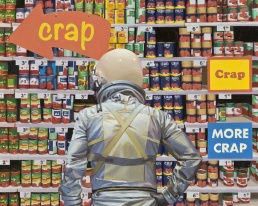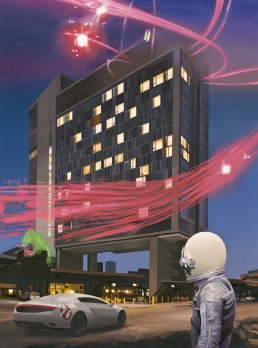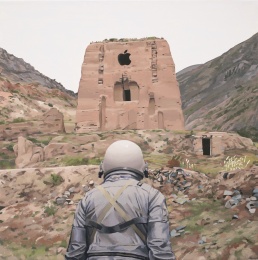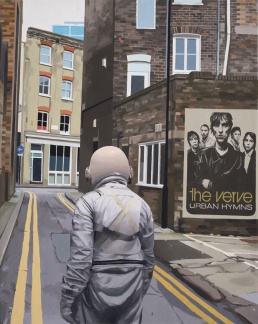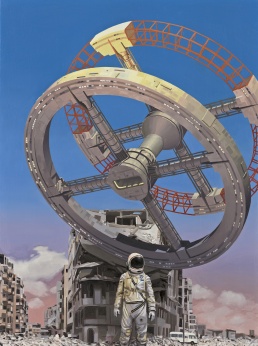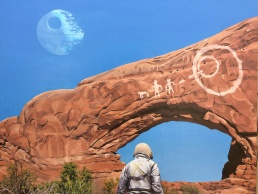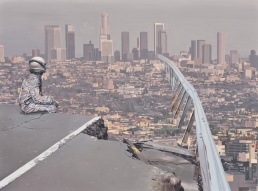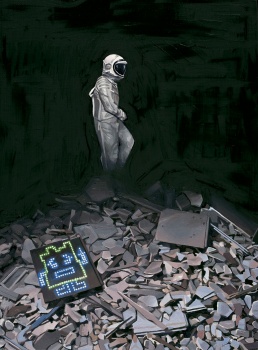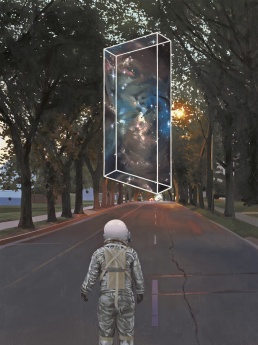This is Scott Listfield
Scott Listfield’s art has been making rounds all over the internet lately. His solitary astronaut exploring eerie desolate landscapes seems to struck a chord with many people. Perhaps it’s because of his nicely executed realistic style of painting. Maybe even because of the nostalgic elements he incorporates in his compositions. But I personally think the reason for his art’s relatability is the poignant feeling of solitude it evokes.
In this age of connectivity being “alone” rarely occurs hence solitude has become a fascinating concept for most of us. We can’t help but gravitate towards this lonesome being searching for meaning over alienating landscapes. Perhaps some of us dread to be the one inside the astronaut’s suit. Perhaps some long for the inner peace that comes with seclusion.
Interview by Crist Espiritu.
Artworks by Scott Listfield.
Where are you from?
I’m from Boston, Massachusetts, in the United States. I still live here even though it’s terrible here in the winter, and none of the places I regularly show my work are within a 1,000 miles. But hey, it’s home
When did you start getting into art? Did you start out at an early age? Did you have formal training?
I can’t remember a time where I didn’t draw. I was always doodling something as a kid, and continued well into my teenage years. But I never considered it anything particularly serious, in part because I wasn’t especially good at it. When I went to University, I didn’t necessarily intend to study art, and I didn’t go to an art school. But I had never not done art and so my first semester I took a drawing class. It was at that point that I started to get serious about it and develop a passion for it. And so I did study art at school, I graduated with a painting major, but it was from a liberal arts college, not an art school, so my training and background are maybe a little different than that of artists who figured out what they wanted to do with their life a bit younger.
“I grew up in the 80’s on Transformers and GI Joe cartoons, Ghostbusters, Back to the Future, Star Wars. It was kind of a hey day for stories which evoked a very certain kind of childhood fantasy.”
What sort of things inspired you early on?
Well, when I was a kid, it was whatever I was watching on television. I grew up in the 80’s on Transformers and GI Joe cartoons, Ghostbusters, Back to the Future, Star Wars. It was kind of a hey day for stories which evoked a very certain kind of childhood fantasy. Now that I’m an adult, I guess I’m still inspired by those things. It took me a while to come back to all of that though, and realize that there’s some worthy subject matter to mine in the influences of my younger days.
Did you have artist that you look up to? Who were they?
Oh, of course, but there’s too many to name. I studied some art history in school, which was tremendously influential, but also, after a while, turned into kind of a burden. I reached a point where I needed to let go of all of my influences and figure out what I wanted to say on my own. I’m sure every artist goes through that. These days I mostly look to my peers. I’m really excited by things other artists working now are doing. There’s a ton of great stuff out there.
“I reached a point where I needed to let go of all of my influences and figure out what I wanted to say on my own.”
So you’re a fan of 90’s Brit-pop. What is your favorite album from this era? Why?
Oh, jeez. If I were cooler I’d say ‘The Stone Roses,’ or maybe ‘Different Class’ by the Pulp. And I do like those albums. But if I’m being honest, my favorite album from that time is ‘Urban Hymns’ by The Verve. Which, for some reason, is not remembered as fondly as other albums from the time. But I loved that album when it came out, and I still do now. A big part of it is that it’s one of two albums I packed with me when I went off to Australia for 4 months after I finished school – along with, weirdly enough Enter the Wu-Tang (36 Chambers), which is about as different an album as you could find. Anybody born within the last 25 years won’t understand this, but music didn’t used to live in a cloud. You used to have to own it on thin pieces of plastic. And so I listened to those two albums, non-stop, for 4 straight months while travelling a different hemisphere. And they still remind me of a kind of youthful adventure. So I like it musically, sure, but it also evokes a lot of memories for me.
“Technology is amazing, but it seems like we’ve decided to follow it wherever it leads us, without really asking if that’s an appropriate direction to go. Is there a point where we say “That’s too much?” or “I don’t need to be able to have a conversation with my refrigerator.”
For the first time, we’re travelling with micro computers where we can access the world’s information at any moment (you know, assuming the local wifi works). That’s a crazy amount of information to have on hand, whenever you want it. I’d also be very surprised if in the next, I don’t know, 20-50 years, these devices didn’t become part of our physical being. Implanted chips in our brains, our hands, or our eyes. I don’t know how I feel about that. Technology is amazing, but it seems like we’ve decided to follow it wherever it leads us, without really asking if that’s an appropriate direction to go. Is there a point where we say “That’s too much?” or “I don’t need to be able to have a conversation with my refrigerator.”
You mentioned Stanley Kubrick’s 2001: A Space Odyssey as an influence of your visuals. What specifically draws you towards this film? What particular aspect of this film fascinates you the most?
Well let’s start by saying it’s a really weird film. It’s like 3 or 4 films in one, and the last one is kind of bonkers. To be honest, the things that captivate me the most about the movie, aside from some of the visuals, which are stunning, is the idea of it as an actual representation of the year 2001. It’s easy to look back now with cynicism, but I think most people thought 2001 would look like that. It’s kind of a standard bearer for what the 21st century was supposed to be. And there’s such a strange disconnect between that vision, and what 2001 actually ended up looking like. It’s the space between those two things that I find really interesting.
Your fascination with the future is quite apparent. Where do you think mankind is headed? What do you think the future would look like?
Let’s start by saying that f I knew that with any certainty, I’d for sure be hanging out with Elon Musk and Richard Branson, and not sitting over here on the couch with my dog. But I do think we’re at a kind of pivotal moment in our relationship with technology.
What would be art’s role in the future?
Who knows? I’d like to say art can serve as a counterbalance, something physical and real in the increasingly digital world we live in. But art is digital now, too. Probably 99.99% of the people who ever see my art will see it as a jpeg online, not in person, as a physical object. And that’s fine with me, honestly. But I’d like to think that art will continue to do what it’s always done: Make us think, make us look harder at things, and make us look for the intangible qualities, like beauty, in our life.
What’s been keeping you busy lately? Do you have upcoming projects you want to share with our readers?
I sure do! I’ve got a show that’s up through May 29th at StolenSpace Gallery in London, then I’ve got a show in July in Los Angeles, and then I’ll be doing my first museum show in August.
“I’ve always thought of my paintings as a series of short stories about the strangeness of the contemporary world, and how we can often feel a little bit like an alien in our own world.”
What keeps you fueled to create? What keeps you inspired?
I’ve always thought of my paintings as a series of short stories about the strangeness of the contemporary world, and how we can often feel a little bit like an alien in our own world. I think, as long as I feel like I still have stories to tell, as long as I still feel that way sometimes, I’ll continue to make these paintings. If I run out of things to say? Who knows, maybe I’ll try something else. But for now, every time I leave my house, every time I’m out walking around and maybe listening to music, every time I find myself in a city that’s not my own, it’s not hard to find that feeling, to get that inspiration. To look at something, a sunset, a supermarket, a forgotten corner of a parking lot, and think for a second about what it must be like to see that for the first time.
Follow Scott Listfield on Instagram @scottlistfield
Follow Crist Espiritu on Twitter and Instagram @crist_espiritu
